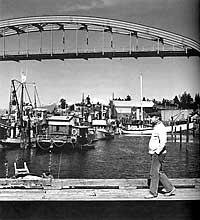"The Accidental Collector": Witness to 1950s NW gay culture, art

In the short run, Wesley Wehr's death on April 12 at age 74 puts his now-posthumous memoir in a special light. The big surprise of "The Accidental Collector: Art, Fossils & Friendships" is not the recycled litany of famous and not-so-famous people he knew but the level at which the book "outs" Wehr and serves as sexual autobiography and eyewitness testimony to a unique gay cultural scene in 1950s Seattle.
Wehr cultivated modesty and silent self-consciousness (as seen from the viewpoint of his book), but he was anything but shy. As he tells it here, the rise of the Northwest School is reconfigured as all-gay, not with heterosexual artist Kenneth Callahan but limited to Mark Tobey, Morris Graves and Guy Irving Anderson, all of whom preceded Wehr in death. As Callahan is unceremoniously dumped, Wehr adds himself; going so far as to quote his own reviews along with a reference letter submitted on his behalf for an unsuccessful Guggenheim Foundation grant application.
After Wehr's prior memoir, "The Eighth Lively Art: Conversations with Painters, Poets, Musicians and the Wicked Witch of the West," the final installment of his life story is much cattier, preoccupied with payback. As a result, it is a better read. This time around, unfortunately, many of the same anecdotes from the first book are repeated. All conversation is filtered through Wehr's recollections based, like Truman Capote's "In Cold Blood," on meticulous reconstructions noted in private immediately afterward. The problem is the uniformity of tone shared by all the speakers.
They all sound just as articulate and measured as Wehr was in life. Page after page of quotations from the high and mighty as told to Wesley Wehr tend to blur together into the author's well-cadenced bass voice. The rest of the stories are without any quotation marks, prefaced by "Morris Graves had already told me ... ," "Guy Anderson once told me ... " All the same, such stories are rich in humor, often at Wehr's or the speaker's expense.
Like the character in the Woody Allen film "Zelig," Wehr managed to be present at key art museum and gallery events, significant literary gatherings, and important Seattle and New York artistic and cultural events attended by other important figures he quotes. Just as often, he seemed to slip back into the background without a trace to go rock hunting in Eastern Washington with increasingly lean, attractive young men.
Besides the nonstop name-dropping, the structure of the book is a problem, as choppy and episodic as the first. Donald Ellegood, the first editor, died before the second book was published; apparently no one took up the slack at University of Washington Press. There are too many typographical errors. Considering so many people are mentioned, there's really no excuse for Juan instead of Joan Miró, Edward instead of Edvard Munch, or Johanna instead of collector Joanna Eckstein. The substance and value of Wehr's observations are too important to allow these and at least a dozen additional errors to stand.
For gay readers and others seeking examples of outing autobiographies, most of the regulation details are here: the boyfriends' and lovers' names; the road trips; the motels; the parties of the gayoisie; the books shared; the favors exchanged; the close quarters living together, the eventual moving on. Wehr comes awfully close to detailing several seductions, but the storyteller remains tantalizingly tasteful throughout. The penultimate chapter, a memoir of Paris in the 1950s, suggests an unrequited love for composer Ned Rorem and ends on a note of bittersweet might-have-been.
In the long run, the score-settling and close-up cultural commentary on the Seattle arts scene will be the chief attraction of "The Accidental Collector." Read the other way, though, as a biased, gay-groupie memoir or globetrotting gay-dilettante memoir, "The Accidental Collector" is the perfect thing to read while suntanning on the beach. Clothing required.
|